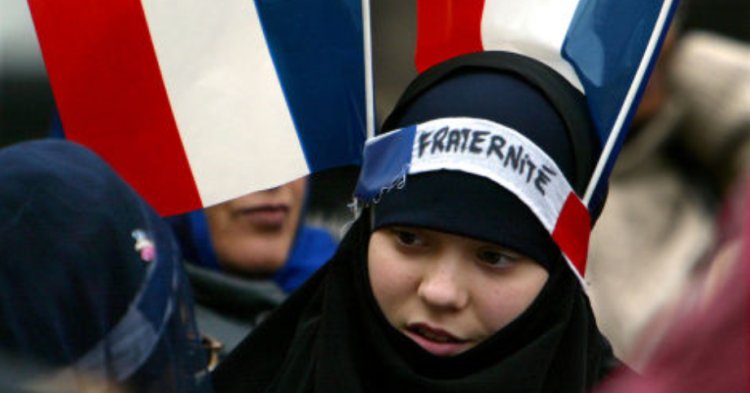Having been born and raised in France, I grew up with the firm belief that religion and the State had to be separated. I was taught that my country inherited a very specific form of secularism from the 1789 Revolution and the Enlightenment, which ensured the equality of all French citizens regardless of their religious and philosophical beliefs : laïcité. As far as I can remember, laïcité has always been omnipresent in public debates. Should girls be kicked out of school for wearing their scarves in the name of laïcité ? Should burkini (a bathing suit that covers the whole body) be prohibited on beaches because it infringed the laïcité principle ? Are halal alleys in supermarkets endangering laïcité ? Ultimately, I had to face the fact that the ideal of the French secularism I grew up with insidiously turned into an excuse to discuss and question the place of Islam in France. This became even more real after the 2015 Paris attacks, when laïcité started to be presented as the antidote to religious obscurantism – meaning, for French politicians, to radical Islamism. But how did we get there ?
Crash-course on laïcité
It took some time for France to evolve from centuries of monarchy of divine right to a secular republic. While secularism represented already an important revendication of the French Revolution, it became embedded in the French legislation only one century later, when the 1882 Jules Ferry law made education compulsory and laïque. Twenty- three years later, the 1905 law officially implemented the separation of the Church and the State. Finally, secularism was enshrined in the first article of the 1958 Constitution, which affirms that “France is an indivisible, laïque and social Republic.” At first, the goal was to make sure that the Catholic Church would not interfere with political matters. However, Catholic authorities refused to comply with some of the law’s provisions, such as the status of religious association, and obtained the special quality of diocesan association in 1923. In addition, a 1907 law made Catholic edifices public property, which means the State has the responsibility to maintain them. But laïcité also ensured that everyone would be treated equally no matter their beliefs or non-beliefs. This initially collateral goal was more recently reasserted in the 2016 Declaration of Laïcité : “[s]tigmatising a religion, imposing restrictions on the religious practices of one particular religion, would be an attack on the Republican principle of Equality, and would be discriminatory.” This is how, in the span of two centuries and a half, this principle became a core French value. However, over the last three decades laïcité has been more and more associated to the debates relating to Islam and the coherence of its fundaments with contemporary French society. Since the 2010s, Muslims have been increasingly targeted by French laws restricting their rights, in the name of laïcité.
The Concordat, an exception to laïcité ?
What I did not mention earlier is that I grew up in Alsace, a region that, together with the department of Moselle, remains under the Concordat regime established by Napoleon Bonaparte in 1801. As a consequence, this territory falls under different rules than the rest of France. For example, we have two more bank holidays : the 26th of December and Good Friday, which also happen to be two important Catholic celebrations. When I was in primary school, kids either attended Catholic courses – usually taught by a priest or a theology teacher –, or they had a common class with believers from other faiths and non-believers, the so-called “moral class”. When enrolling in my (public) school, being taught Catholicism was the option by default and parents had to unsubscribe their children for them not to attend religion classes. In parallel, in school and in the media, teachers, journalists and politicians kept repeating that French secularism was the key to achieve a fair and equal society. There were endless debates on TV about whether or not burkinis were threatening laïcité, but no one ever questioned the fact that, in an area of almost 3 million inhabitants, so many kids were taught Catholicism at school from age 6 to 14 and people had extra bank holidays based on religious celebrations. And here is the catch : the knights of laïcité only fight for this cause when it serves a narrative presenting Islam as a threat to French society and values.
The antidote to communitarianism and religious extremism ?
Nowadays, when you hear about laïcité in French debates the words “Islam” and “(radical) Islamism” follow most of the time. Our version of secularism is also often presented as the solution to Islamist terrorism. According to this theory, this antidote would prevent ill-intentioned Islamists - who aim to separate Muslims from the French Republic - from destroying our society from within by imposing their religion as political project. For years, this argument has been defended by renowned far-right and conservative figures such as Jean-Marie le Pen, his daughter Marine and the polemist Eric Zemmour, as illustrated by a recent interview given to CNews. But since 2015, counter-terrorism discourses have been increasingly targeting Islam as the main source of radical extremism in France, even in the socialist administration of François Hollande and the centrist party of Emmanuel Macron. Laïcité has been consecrated as the cure to this endemic threat. This phenomenon recently peaked when Macron’s government put forward the bill “against separatism”. This draft law aims at dismantling radicalization networks and at strengthening the 1905 law. In this respect, the French magazine Le Point points out that it might even be renamed “bill to reinforce laïcité and republican values”. The President and his party, La République en Marche, deny the bill’s targeting of Muslims and affirm that it is dedicated to tackle any form of religious extremism. The bill never mentioned “Islamism”, in an attempt to avoid the stigmatization of Muslims, despite members of the government and the president himself clearly pointing at Islam in most of their public statements and speeches. Interior Minister Gérald Darmanin even acknowledged that the draft law it targeted mainly “radical Islam”. What if this laïcité that politicians and media present as the guarantee of equality in our country had become, over the years, the instrument to alienate and stigmatize a group of people ?
Time to move on
As Sandra Laugier and Albert Ogien put it in an article for the French newspaper Libération, it seems that the defenders of laïcité have themselves become “fanatics” who “confuse the defense of ‘republican values’ with a crusade against a minority designated as the popular scapegoat” [author’s translation]. It is indeed hard to not see French secularism as a principle that is used à la carte, only when it serves an anti-Islamist – and to some extent an anti-Muslim – narrative. Over the last three decades, it seems that laïcité has become one of the tools that participate to what Clara Eroukhmanoff theorizes as the indirect securitization of Islam. It lost its purpose and, instead of protecting diversity and freedom of religion, serves as an argument to antagonize and alienate a group of people based on their religious beliefs. Can a principle created at the dawn of the 20th century really suffice to tackle the issues faced today by the French society ? Isn’t it time to rethink French secularism in a more equal manner ? These questions deserve to be addressed in France. It seems, indeed, that laïcité is not the antidote to terrorism and radicalization : it was not yesterday and it probably won’t be tomorrow.


1. Le 28 décembre 2020 à 21:08, par Catherine Guisan En réponse à : The French Laïcité : From a core value to an excuse for stigmatization
En réponse à : The French Laïcité : From a core value to an excuse for stigmatization
Excellent article, merci. J’enseigne la politique européenne aux USA, et votre article me tient à jour sur les débats sécuritaire et sur l’Islam en France, Catherine
2. Le 3 mars 2021 à 03:28, par James En réponse à : The French Laïcité : From a core value to an excuse for stigmatization
En réponse à : The French Laïcité : From a core value to an excuse for stigmatization
The author doesn’t have even basic understanding of Islam.! Islam is sociopolitical system that either you are a Muslim or heretic. If you are a heretic who are Athirst, you have to either convert or be killed. On the other hand, if you are a heretic who believes in god but not Muslim, you are a don’t have any civil rights and have to pay especial tax called “Jaziah”. This is not radical islam ! This is the god order from Quran ! All Muslims have to obey the Khalifat who is political and religious leader of the people. The author and those who think like her should live for a couple years in an Islamic state, especially as a woman, and become subjugated to Islamic laws before before writing about the evils of Laicite and Secularism !
Suivre les commentaires : |
|
